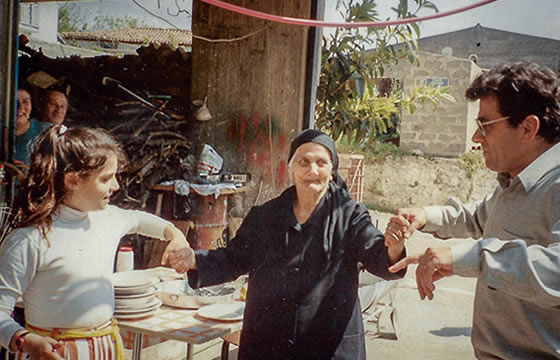 The chasms of experience that divide us can be bridged with an open mind, reflection and appreciation of those differences.
The chasms of experience that divide us can be bridged with an open mind, reflection and appreciation of those differences.
Mothers-in-law do not enjoy good press, and I confess I had a prickly relationship with mine. She was a Greek village woman, illiterate, and irrevocably attached to her traditional way of life: she and I were divided by every possible fact of our lives, facts that were more like chasms.
Looking back over the many years during which I engaged in much reflection, I now think the main chasm was that of power. Aphrodite, named for a goddess, force of nature, was the daughter and widow of Orthodox priests, and her family had lived in the village for generations. Her power was her status and her position. I was the outsider, and my power resided in my achievements, my education and career, all of which meant absolutely nothing in this new-old world to which I was trying fairly desperately to adjust.
It took an Australian visitor, an erstwhile colleague, to make me understand the extent of Aphrodite’s power, and our lack of it.
Jane took a keen interest in the animals, the garden, the cheese, wine, and bread making, the olive harvest, the simplicity and the implacable routine of rural life, the way in which Aphrodite had raised six children, and coped with the loss of three, against a background of poverty and war. ‘You do realise, don’t you? that your mother-in-law could crawl out of a nuclear fallout shelter and start again, whereas we wouldn’t have a hope, you and I.’ Jane was right. But off she went to return to her high-achieving life, leaving me with my recurrent sense of failure.
But the more I learned about Aphrodite’s life, the more I mastered that feeling, and my self-pity as well. My life had not been programmed, nor had it been interrupted by cataclysmic events. From 1940 until 1950 Greece was on a war footing, the German and Italian occupation having been followed by the horrendous Civil War. During that decade, Aphrodite’s main concern was that of raising her children, and indeed defending them.
Her priest husband was often away, working in the olive groves or attending to his flocks, both four-legged and two-legged. He was later sent away to a seminary in Corinth, because his bishop advised him that his life may be in danger now that he had rashly preached against the Communists.
Soldiers from the forces of occupation often entered the house. Aphrodite had no German or Italian, but kept her husband’s clerical robes handy, and indicated them as proof that her husband was a man of peace and not involved in the local resistance: the next village had been razed to the ground because of the activities of the latter. The soldiers took the hint. Fortunately. The threats multiplied and deepened during the Civil War. A neighbour had a committed Communist son, and came to Aphrodite in terror one day: the right-wing security battalions were searching houses in the area. ‘They’ll find his books,’ she said. ‘Bring them here,’ ordered Aphrodite. She hid them in her old house: the books were never found.
During this period the Communist guerillas lived in caves in the mountains behind the village, and would descend to raid houses at night, seizing supplies such as flour, rice and pasta from families who usually had no food to spare. One night a group, armed to the teeth, came to Aphrodite’s house, where she was alone with her children. Aphrodite stood only five feet in her stockinged feet, but she always seemed absolutely fearless to me. And so she must have been that night. She knew all these young men, and proceeded systematically to upbraid and shame them. She used a formula, fixed them with her basilisk gaze, and pointed her finger at each one: ‘You. What are you thinking of? Your mother and I are second cousins, you know that! Have you no shame?’ In the end the guerillas left empty-handed.
I knew I could not have demonstrated such courage, but from Aphrodite and the other women I learned more lessons: the courage of coping, for example. And the comfort of faith. An unwavering attachment to Orthodoxy was their great consolation, and enabled them, it seemed to me, to accept the circumstances they could not change.
Whatever God wills, they would say, with a resigned air. I also learned that the group was all, and that rebellious souls would suffer if they persisted in their waywardness. Perhaps the most important lesson was that of resistance to the erosion of the spirit. Despite their harsh lives, these women took pleasure in simple things: the smile of a child, the companionship of their friends, the sense of achievement at having provided meals for another day. They taught that life can be lived well, no matter on what scale and in what circumstances.
Aphrodite and the Others, Gillian Bouras. Language: English. 160 pages, Paperback. ISBN: 978-960.99111-2-2. What happens when Aphrodite, an illiterate wife of a priest living in a Peloponnesian village in Greece, meets her Australian daughter-in-law who comes to visit and unexpectedly stays? Gillian Bouras answers this question in her book Aphrodite and the Others (160 p, paperback) where she describes her life as a foreign wife in Greece, and the challenges she faced in living within Greek culture and society and how she came to terms with her Greek mother-in-law. Her book received a NSW State Literary Award in 1994.